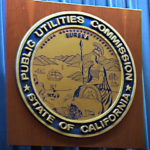Today, Volkswagen announced the “Dieselgate” scandal – VW’s cheating on emissions ratings – affects at least 11 million Volkswagen cars sold world-wide, and that the company is setting aside 6.5 billion euros, or about $7.3 billion — to cover the cost of fixing the cars to comply with pollution standards and to cover other expenses. Given that the EPA has warned their fine alone could add up to $18 million dollars, and given that other countries are launching investigations and may well levy their own penalties, and given the number of class action lawsuits being launched, VW is facing huge costs just in penalties. Will Volkswagen survive this, or will it be driven out of business? What will happen to the beautiful plans VW is developing around all-electric cars and self driving cars?
It’s too early to assess the full impact, but the stock market is expecting a huge problem. On Monday Volkswagen’s stock price fell by 20% and today the stock price fell by another 20%.
This episode demonstrates the value of strong laws regulating corporate behavior, a strong legal system and regulatory agencies with which to enforce those laws. An individual might murder someone and when caught face years in jail or perhaps execution. What’s the typical response to corporate wrongdoing? A slap on the wrist, fines, perhaps a few people are fired, but they rarely amount to much.
It’s just WRONG to have such different penalties levied against individual wrong-doers and corporate wrong-doers. Yet, that’s the way it is. The corporate equivalent to jail-time or execution for wrong-doing is to levy huge fines, to prohibit sales of certain products or services, to cancel the corporation’s charter, to throw individuals at the corporation into jail, etc.
In this case it remains to be seen what actual penalties would be levied against Volkswagen or its employees.
A quick rundown on the likely costs are
- Government imposed penalties – the EPA says $18 billion max on 500,000 cars – what’s the penalty for 11 million cars?
- Civil lawsuits from car owners
- Shareholder lawsuits, because obviously the Volkswagen management failed to disclose pertinent information
- The cost of developing a fix and deploying it to those 11 million cars
- Loss of sales as people lose confidence in Volkswagen and potentially all Diesel engines
I see via Yahoo Finance![]() that Volkswagen had over $200 billion in revenue during 2014, nearly $30 billion in cash, and all kinds of assets against which the company could make loans. But VW does have $114 billion in current debt. That suggests the possibility VW could weather this storm. We don’t yet know how deep the penalties will cut.
that Volkswagen had over $200 billion in revenue during 2014, nearly $30 billion in cash, and all kinds of assets against which the company could make loans. But VW does have $114 billion in current debt. That suggests the possibility VW could weather this storm. We don’t yet know how deep the penalties will cut.
Government penalties
A quick rundown on the governments who are known to have launched investigations![]() in this matter:
in this matter:
- US: EPA, CARB, and the Dept of Justice
- South Korea
- France

- Italy
- Germany: Both the Federal government, and in Lower Saxony (where VW is headquartered)
- Switzerland (looking into whether the same sort of cars sold in the US are sold in Switzerland)
- Spain (no investigation yet, the Industry Minister expressed hope the scandal would not affect VW’s investments in Spain)
- Netherlands (no separate tests planned)
- Sweden (just finished their testing for 2015, but will put VW under extra scrutiny in 2016)
- Czech Republic (following Germany’s lead)
- European Commission
Reports from Australia![]() indicates that VW/Audi staff in that country do not yet know if the scandal affects any cars sold in that country.
indicates that VW/Audi staff in that country do not yet know if the scandal affects any cars sold in that country.
The scandal is widening beyond Volkswagen. Many press reports say this casts doubt on the idea Diesel engines could ever be cleaned up, and that “we” should simply entirely abandon Diesel engines. In any case the practical effect is that regulators in some countries are closely examining not just Volkswagen’s vehicles, but Diesels made by other corporations.
Daimler has already announced they’re not affected by this problem![]() . “We heard of the EPA’s accusations against VW from the press. The issue described by the press does not apply to Mercedes-Benz Cars,” Daimler said in an e-mailed statement, adding it was not aware of any investigation of Mercedes.
. “We heard of the EPA’s accusations against VW from the press. The issue described by the press does not apply to Mercedes-Benz Cars,” Daimler said in an e-mailed statement, adding it was not aware of any investigation of Mercedes.
Civil Penalties
At this moment I’ve seen several press releases announcing class action lawsuits against Volkswagen. Surely this is just the beginning.
Some grounds I can think of:
- VW car owners feeling betrayed by Volkswagen management
- The affected VW cars may lose resale value, or governments may prohibit resale of those cars, or may prohibit them from driving on the road at all
- The “fix” that VW makes to correct the emissions problem will affect their performance
- VW’s TDI Diesel vehicles offered the best of both worlds — a green image (that we now know was utterly false) — with a great fun driving experience
- VW Management clearly lied to shareholders between 2009 and 2015
Cost of fixing the problem
The source of the problem, according to EPA evidence, is that VW programmed their emissions control system to behave one way when undergoing emissions tests, and to behave another way at all other times.
It seems that one easy fix is to change that software so their TDI Diesel cars always turn up the emissions control equipment at all times. Surely if these cars can have clean emissions in the lab, they could do it on the road.
But … at what cost to performance?
VW’s TDI Diesel vehicles were, by all reports, fun to drive because of the powerful engine. Clearly VW did this cheat so they could deliver a fun-to-drive vehicle (Funkengruven).
That simple fix I just outlined will obviously degrade performance and therefore VW will be reluctant to take that route. Instead they’ll look into which settings will enable enough emissions controls to please the regulators, while not degrading performance so much to anger the customers. It’s possible that VW will be unable to tread this fine line.
The other automakers spray “urea” into the exhaust stream to fix diesel emissions problems. Retrofitting a urea tank into the VW cars on the road will apparently be extremely difficult and costly.
Sales loss
Loss of consumer confidence? Will governments prohibit Volkswagen from selling their cars? If VW’s cars no longer have that zoomy pep, who will want to buy them?
Volkswagen had just reached the point of being the largest automaker in the world in terms of sales.
Total impact – Summary
What I’m worried about is whether VW will have the ability to continue their electric vehicle development plans.
Over the last few years the company had boasted that by 2018 it would be a leader in electric vehicles. Last Friday I had written a piece talking about how VW’s electric vehicle plans were progressing, and IMMEDIATELY upon finishing it I received a breaking news alert of the EPA/CARB allegations.
While, at this time, there is no hard prediction of the cost Volkswagen will pay for this transgression, it’s clear from the above that the cost could be huge. Huge enough to threaten VW’s existence, as reflected in the company’s plummeting stock price.
The higher the cost, the greater the likelihood of damage to VW’s electric vehicle plans. But that depends on the nature of the penalties, right?
There is a precedence in using penalties like this not to enact financial damage, but to force a company to take a different direction. For example, to force Volkswagen to give up on diesel engines entirely and to embrace electrification in a big way. The principle is to force a company to do something useful for the general welfare of us all.
Consider the 2012 settlement between the California Public Utilities Commission and NRG. In that case, NRG had bought some companies that had done wrong-doing during California’s energy crisis over 10 years ago. In most cases corporate wrong-doing results in heavy fines, but instead the CPUC and NRG developed a plan whereby NRG would launch their eVgo service in California. The supposed public benefit is that California now has more charging stations than it might have otherwise. That blessing is degraded by the very poor service we get from eVgo.
At the top of this I drew a comparison between the penalty paid by an individual for committing a crime — typical result is jail time, and sometimes execution — and the penalty paid by corporations who commit crimes.
Usually corporations get off with slaps on the wrist. Regulators might ignore corporate wrong-doing, or they might levy a lenient fine, or the laws might limit the damages paid by corporations, etc. In the above list of actions taken by various governments, we see Spain’s government expressing worry over the risk to VW’s investments in Spain rather than expressing a firm resolve to enforce the law.
Will this time be different? Will this corporate wrong-doer face serious penalties, or will they somehow fix the problem and go on with business?
- Is there enough Grid Capacity for Hydrogen Fuel Cell or Battery Electric cars? - April 23, 2023
- Is Tesla finagling to grab federal NEVI dollars for Supercharger network? - November 15, 2022
- Tesla announces the North American Charging Standard charging connector - November 11, 2022
- Lightning Motorcycles adopts Silicon battery, 5 minute charge time gives 135 miles range - November 9, 2022
- Tesla Autopilot under US Dept of Transportation scrutiny - June 13, 2022
- Spectacular CNG bus fire misrepresented as EV bus fire - April 21, 2022
- Moldova, Ukraine, Georgia, Russia, and the European Energy Crisis - December 21, 2021
- Li-Bridge leading the USA across lithium battery chasm - October 29, 2021
- USA increasing domestic lithium battery research and manufacturing - October 28, 2021
- Electrify America building USA/Canada-wide EV charging network - October 27, 2021




















Pingback: VW to be gravely damaged by Dieselgate scandal, may delay VW’s EV plans | The Long Tail Pipe